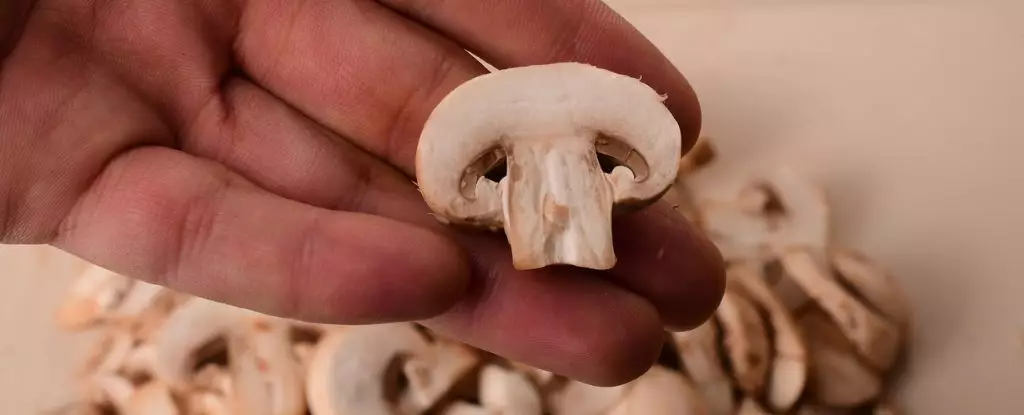In the realm of nutrition and health, exotic mushrooms like Lion’s Mane often steal the spotlight for their purported medicinal benefits. Yet, nestled in the common white button mushroom (Agaricus bisporus) lies a potential powerhouse with significant implications for cancer care. Surprisingly, research indicates that this ubiquitous fungus, while predominantly recognized for its culinary applications, may harbor some extraordinary immune-boosting properties that could potentially play a role in slowing the progression of prostate cancer.
Scientific investigations at City of Hope, a leading cancer research and treatment institution in the United States, have begun illuminating the unanticipated benefits of white button mushrooms. Despite the fact that the U.S. Food and Drug Administration (FDA) has yet to endorse any food-derived products as official cancer treatments, the researchers are diligently working to build a foundation of scientific evidence to highlight this mushroom’s therapeutic potential. Recent studies involving both mice and human participants suggest that white button mushroom extracts may serve as an adjuvant therapy for prostate cancer, thereby enhancing traditional treatment methodologies.
Cancer biologist Shiuan Chen from City of Hope emphasizes a transformative vision for cancer treatment, stating, “We’re finding that plant-derived substances may one day be used to support traditional cancer treatment and prevention practices.” This intriguing perspective opens a fertile ground for integrating diet-based strategies into established cancer therapies, advocating for a future where “food as medicine” becomes standard practice.
To comprehend the role white button mushrooms could play in cancer therapy, it is essential to explore the defense mechanisms employed by tumors. Prostate cancer, like many forms of malignancy, has evolved to fend off the body’s defenses, primarily by generating myeloid-derived suppressor cells (MDSCs). These immature white blood cells are notorious for their capacity to inhibit immune responses, thus allowing tumors to thrive. Research suggests that white button mushrooms possess the ability to disrupt this protective barrier, strengthening the body’s immune capabilities against tumor growth.
Previous findings from a Phase I clinical trial provide an optimistic outlook regarding the effects of white button mushroom extracts on prostate cancer. Volunteers consuming mushroom tablets daily exhibited decreased levels of circulating MDSCs and some experienced a drop in prostate cancer biomarkers to undetectable levels. Building on this promising data, researchers have initiated follow-up studies involving mouse models and a Phase II clinical trial that gathers blood samples from prostate cancer patients to investigate these effects further.
Initial results are encouraging: in mouse studies, the extract not only delayed tumor growth but also improved survival rates. Moreover, patients undergoing treatment with the mushroom extract have shown fewer suppressor cells and an increase in anti-tumor immune cells, suggesting that the white button mushroom may enhance the immune system’s capacity to battle cancer more effectively.
While the findings thus far are compelling, understanding the precise biochemical components that confer these anti-cancer benefits remains a complex challenge. Botanical products, including mushrooms, contain a myriad of compounds, such as soluble fibers, proteins, lipids, and phytochemicals, which could collectively exert therapeutic effects against cancer cells. This complexity necessitates a cautious approach in clinical trials focusing on the safety and efficacy of these extracts, rather than exclusively identifying the mechanisms of action.
Xiaoqiang Wang, a staff scientist at City of Hope and the study’s first author, reminds us of the ongoing nature of this research: “While our research has promising early results, the study is ongoing.” This sentiment reiterates the need for sustained exploration into the realm of nutritional oncology and underscores the potential for mushrooms as a complementary resource in cancer prevention and treatment.
The narrative surrounding the white button mushroom is shifting as research unveils its possible role in enhancing immune response and combating prostate cancer. While the evidence is still emerging and the regulatory pathway is complex, the integration of dietary elements into cancer management could signify a pioneering approach in navigating the disease. As scientists continue to unveil the depths of this common fungus, society may witness a groundbreaking evolution in how we perceive food—not merely as sustenance but as a crucial element in the fight against cancer.

